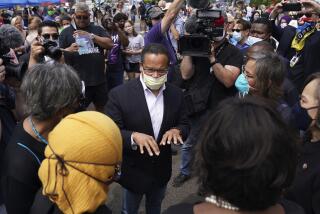U.N. Hears Good, Bad on Racism in U.S.
- Share via
WASHINGTON — In a remarkable amalgam of candid analysis and unabashed boosterism, the United States told the world community Thursday that it has outlawed racial discrimination but has failed to wipe it out.
The Clinton administration sent a 100-page report to the Geneva-based United Nations Committee on the Elimination of Racial Discrimination, asserting that U.S. anti-bias laws are among the world’s most stringent but conceding that abuses such as racial profiling and economic inequality remain.
The report pointed with pride to a generation of affirmative action laws, which it said has helped to break down economic barriers between the races despite recent backtracking in California and some other states.
The report, the first of its kind ever prepared by the U.S. government, is required by the U.N.’s anti-racism convention, which Washington ratified in 1994. All countries signing the treaty are expected to analyze their own practices in living up to it. The United States, the report said, is in compliance with the legal requirements of the pact, despite the lingering problems.
“Racial discrimination persists against various groups, despite the progress made through the enactment of major civil rights legislation,” said the report, prepared by the State Department with the aid of the White House, the Justice Department and other agencies. “The path towards true racial equality has been uneven and substantial barriers must still be overcome.”
Nevertheless, the top human rights officials of the State and Justice departments--Assistant Secretary of State Harold Koh and Assistant Atty. Gen. Bill Lann Lee--engaged in only-in-America rhetoric when they recalled at a news conference their histories as children of Asian immigrants.
Adding a reference to Czech-born Secretary of State Madeleine Albright, Koh, son of a Korean diplomat, said: “The United States remains a land of promise, where the children of immigrants cannot just aspire but actually grow up to become secretary of State, assistant attorney general and assistant secretary of State.”
Koh said that a foreign official once told him that the United States was probably the only country in the world where the son of a foreign diplomat could become a diplomat in his adopted land. Lee, whose origins are considerably less lofty, said: “If my father had stayed in China, I might be carrying night soil around the farm.”
But the report was unsparing in its catalog of racial abuses, citing:
* “The persistence of attitudes, policies and practices reflecting a legacy of segregation, ignorance, stereotyping, discrimination and disparities in opportunity and achievement.
* “Inadequate enforcement of existing anti-discrimination laws.
* “Economic disadvantage. . . . Persons belonging to minority groups are disproportionately at the bottom of the income distribution curve.
* “Persistent discrimination in employment and labor relations.
* “Continued segregation and discrimination in housing . . . , public accommodation and consumer goods. Even where civil rights laws prohibit segregation and discrimination in these areas, such practices continue.
* “Lack of access to business capital and credit markets.
* “Lack of access to technology and high-technology skills.
* “Lack of educational opportunities.
* “Discrimination in the criminal justice system.”
The report listed affirmative action programs--beginning with an executive order signed by President Kennedy in 1961--as an example of U.S. efforts to meet the goals of the U.N. program. It conceded that California’s Proposition 209, which dismantled most state affirmative action programs, along with similar actions in other states have eroded affirmative action.
The report also cited examples of racial bias in the United States, including the beating of black motorist Rodney G. King by Los Angeles police officers; the murder of James Byrd Jr., a black man who was dragged to death behind a pickup truck in Texas; and a Florida hotel’s requirement that blacks wear wrist bands to identify them as guests.
More to Read
Sign up for Essential California
The most important California stories and recommendations in your inbox every morning.
You may occasionally receive promotional content from the Los Angeles Times.













